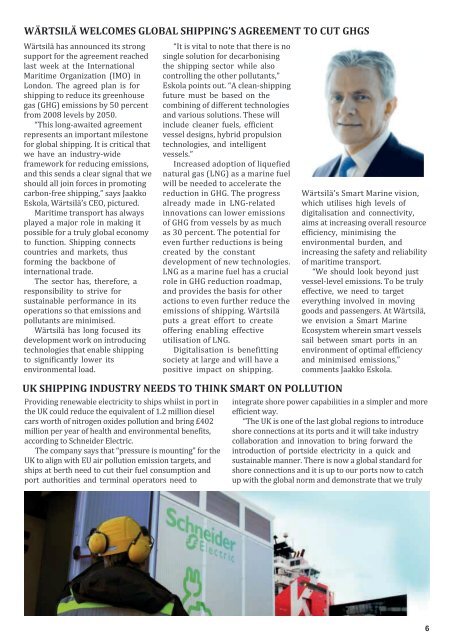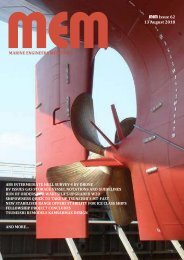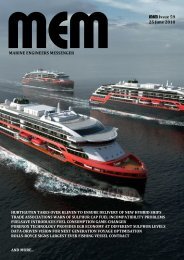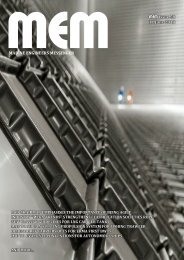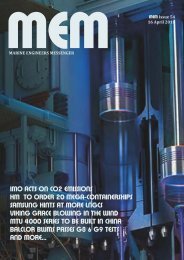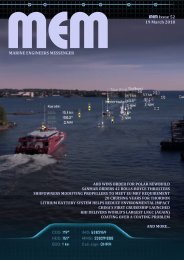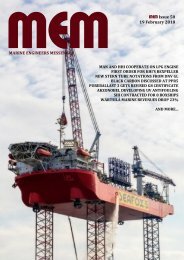Create successful ePaper yourself
Turn your PDF publications into a flip-book with our unique Google optimized e-Paper software.
WÄRTSILÄ WELCOMES GLOBAL SHIPPING’S AGREEMENT TO CUT GHGS<br />
Wärtsilä has announced its strong<br />
support for the agreement reached<br />
last week at the International<br />
Maritime Organization (IMO) in<br />
London. The agreed plan is for<br />
shipping to reduce its greenhouse<br />
gas (GHG) emissions by 50 percent<br />
from 2008 levels by 2050.<br />
“This long-awaited agreement<br />
represents an important milestone<br />
for global shipping. It is critical that<br />
we have an industry-wide<br />
framework for reducing emissions,<br />
and this sends a clear signal that we<br />
should all join forces in promoting<br />
carbon-free shipping,” says Jaakko<br />
Eskola, Wärtsilä’s CEO, pictured.<br />
Maritime transport has always<br />
played a major role in making it<br />
possible for a truly global economy<br />
to function. Shipping connects<br />
countries and markets, thus<br />
forming the backbone of<br />
international trade.<br />
The sector has, therefore, a<br />
responsibility to strive for<br />
sustainable performance in its<br />
operations so that emissions and<br />
pollutants are minimised.<br />
Wärtsilä has long focused its<br />
development work on introducing<br />
technologies that enable shipping<br />
to significantly lower its<br />
environmental load.<br />
“It is vital to note that there is no<br />
single solution for decarbonising<br />
the shipping sector while also<br />
controlling the other pollutants,”<br />
Eskola points out. “A clean-shipping<br />
future must be based on the<br />
combining of different technologies<br />
and various solutions. These will<br />
include cleaner fuels, efficient<br />
vessel designs, hybrid propulsion<br />
technologies, and intelligent<br />
vessels.”<br />
Increased adoption of liquefied<br />
natural gas (LNG) as a marine fuel<br />
will be needed to accelerate the<br />
reduction in GHG. The progress<br />
already made in LNG-related<br />
innovations can lower emissions<br />
of GHG from vessels by as much<br />
as 30 percent. The potential for<br />
even further reductions is being<br />
created by the constant<br />
development of new technologies.<br />
LNG as a marine fuel has a crucial<br />
role in GHG reduction roadmap,<br />
and provides the basis for other<br />
actions to even further reduce the<br />
emissions of shipping. Wärtsilä<br />
puts a great effort to create<br />
offering enabling effective<br />
utilisation of LNG.<br />
Digitalisation is benefitting<br />
society at large and will have a<br />
positive impact on shipping.<br />
Wärtsilä’s Smart Marine vision,<br />
which utilises high levels of<br />
digitalisation and connectivity,<br />
aims at increasing overall resource<br />
efficiency, minimising the<br />
environmental burden, and<br />
increasing the safety and reliability<br />
of maritime transport.<br />
“We should look beyond just<br />
vessel-level emissions. To be truly<br />
effective, we need to target<br />
everything involved in moving<br />
goods and passengers. At Wärtsilä,<br />
we envision a Smart Marine<br />
Ecosystem wherein smart vessels<br />
sail between smart ports in an<br />
environment of optimal efficiency<br />
and minimised emissions,”<br />
comments Jaakko Eskola.<br />
UK SHIPPING INDUSTRY NEEDS TO THINK SMART ON POLLUTION<br />
Providing renewable electricity to ships whilst in port in<br />
the UK could reduce the equivalent of 1.2 million diesel<br />
cars worth of nitrogen oxides pollution and bring £402<br />
million per year of health and environmental benefits,<br />
according to Schneider Electric.<br />
The company says that “pressure is mounting” for the<br />
UK to align with EU air pollution emission targets, and<br />
ships at berth need to cut their fuel consumption and<br />
port authorities and terminal operators need to<br />
integrate shore power capabilities in a simpler and more<br />
efficient way.<br />
“The UK is one of the last global regions to introduce<br />
shore connections at its ports and it will take industry<br />
collaboration and innovation to bring forward the<br />
introduction of portside electricity in a quick and<br />
sustainable manner. There is now a global standard for<br />
shore connections and it is up to our ports now to catch<br />
up with the global norm and demonstrate that we truly<br />
6


